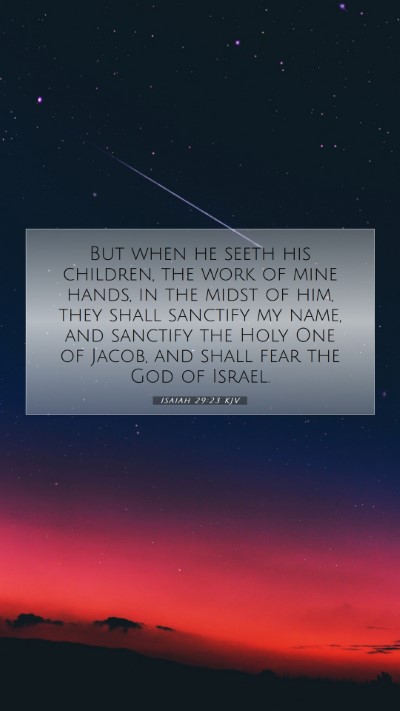Understanding Isaiah 29:23: A Comprehensive Commentary
Isaiah 29:23 states: "But when he seeth his children, the work of mine hands, in the midst of him, they shall sanctify my name, and sanctify the Holy One of Jacob, and shall fear the God of Israel." This verse illuminates a profound aspect of divine purpose and human experience, particularly within the context of restoration and reverence towards God.
Summary of Verse Meaning
The essence of Isaiah 29:23 reflects a future time of acknowledgment where God’s people recognize the sanctity of their Creator through the lens of His works. The verse signifies a covenantal relationship—where the recognition of God's handiwork leads to reverence and a renewed commitment to His name.
Insights from Commentaries
-
Matthew Henry:
Henry states that this verse emphasizes the revival of Israel’s reverence for God upon witnessing His providence and grace in their lives. The term “work of mine hands” denotes not only the physical descendants but also the spiritual offspring—characterizing God's ultimate authority and craftsmanship over creation. The acknowledgment of their sanctity leads to an assurance of divine presence and blessing.
-
Albert Barnes:
Barnes elaborates on the idea of children being the 'work of God's hands', referring to the faithful remnant who remain devoted despite adversities. This fidelity triggers a sanctifying reaction, where the acknowledgment of God’s sovereignty leads them to fear and honor Him. Barnes also suggests that the phrase captures a prophetic vision of future restoration when the Israelites will fully embrace their identity as God’s chosen people.
-
Adam Clarke:
Clarke highlights the harmony between God’s creation and His people, emphasizing that the 'work of mine hands' signifies both the physical creation of Israel and the spiritual rebirth of its members. It prepares the ground for sanctification and worship. Clarke stresses that this transformation will inspire a holy fear—an awe and respect that initiates genuine worship.
Application of the Verse
Isaiah 29:23 is not only a declaration of past and future realities but serves as an invitation for contemporary believers to reflect on their relationship with God. Here are some applications:
-
Recognition of God’s Work:
Understanding that all creation reflects God’s handiwork can lead to a deeper appreciation of life and its blessings. Believers are encouraged to observe the beauty and order of the world as a reflection of the Creator.
-
Sanctification of God’s Name:
In a world where God’s name may be taken lightly, this verse calls for action. Families and communities should prioritize honoring and sanctifying God’s name in their daily lives through actions and decisions.
-
Fear of God:
The healthy fear referenced illustrates a respect and reverence for God that influences moral and spiritual choices. This apprehension should foster a culture of worship and adherence to divine principles.
Cross References
- Isaiah 43:7: "Everyone who is called by my name, whom I created for my glory, whom I formed and made."
- Jeremiah 31:33: "This is the covenant I will make with the people of Israel... I will put my law in their minds and write it on their hearts."
- Ezekiel 36:23: "I will show the holiness of my great name, which has been profaned among the nations."
Conclusion
Isaiah 29:23 encapsulates a profound promise of restoration and worship through the recognition of God’s sovereignty. As believers engage in Bible study and reflect on this verse, they uncover deeper meanings and implications for their lives, moving towards an enriched understanding of Scripture.
Further Study Resources
- Engage in Bible study groups to discuss the implications of this verse and its applications in daily life.
- Utilize online Bible study tools for deeper research into the historical and cultural contexts of Isaiah.
- Explore Bible study guides and commentaries that delve into the themes of sanctification and divine purpose.
By understanding the verse Isaiah 29:23 through various biblical exegeses, believers can find deeper meaning and apply these lessons in their journey of faith.


